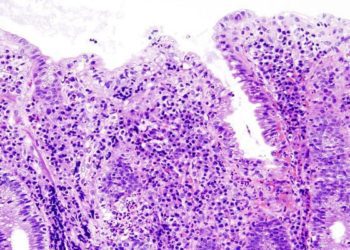2 Minute Medicine Rewind April 18, 2022
Association of Maternal Autoimmune Diseases With Risk of Mental Disorders in Offspring in Denmark
1. Prenatal exposure to maternal autoimmune diseases was linked with a higher overall risk of developing psychiatric and neurodevelopmental disorders in childhood.
Evidence Rating Level: 1 (Excellent)
Autoimmune diseases may induce behavioural and neurochemical changes in offspring. Early-onset neurological problems in youth have been linked with a maternal history of autoimmune disorders, but evidence to date is limited. A population-based cohort study in Denmark followed 50 863 children of mothers with autoimmune diseases and 2 203 371 children of mothers without. The main outcome was the association between maternal autoimmune disease and any mental disorder in offspring. Follow-up occurred at the earliest possible age of onset of the disorder, until the date of the first diagnosis, over a period of up to 38 years. Of these patients, 13.76% were diagnosed with a mental disorder with an overall incidence that was higher among exposed offspring (9.38 per 1000 person-years, compared with 7.91 per 1000 person-years) and a 16% higher risk of overall mental disorders (HR, 1.16; 95% CI, 1.13-1.19). This risk was observed across most system types of autoimmune diseases, including for organic disorders (HR, 1.54; 95% CI, 1.21-1.94), schizophrenia (HR, 1.35; 95% CI, 1.21-1.51), obsessive-compulsive disorder (HR, 1.42; 95% CI, 1.24-1.63), mood disorders (HR, 1.12; 95% CI, 1.04-1.21) and neurodevelopmental disorders (HR, 1.21; 95% CI, 1.08-1.36). These findings lend support to earlier screening and surveillance in childhood.
1. Depressive symptoms may be characterized in patients at the time of breast cancer diagnosis using the HADS scale.
Evidence Rating Level: 2 (Good)
Breast cancer has been linked with a 5x greater risk of developing depression. Depressive symptoms may vary greatly among patients along a spectrum from mild to severe. The CANTO-DEePRESS prospective observational cohort study aimed to develop a more prognostic tool for severe depression among patients with breast cancer (BC) by characterizing longitudinal symptom patterns. The cohort included 4803 adults with a diagnosis of stage I to III BC who had not received prior treatment. The primary outcome consisted of depressive symptoms that were operationalized using the HADS scale. Scores were calculated at diagnosis and follow-up periods of 3-6 months, 12 months, 36 months, and 60 months. Patients were divided into trajectory groups depending on the nature and progression of their symptoms. The key findings were that a significant proportion of patients had intermediate, worsening depression, and stable depression: 22.4% and 3.2% of patients experienced intermediate, worsening depression and stable depression, respectively. Depressive symptoms were linked with lower household income, family history of BC, obesity, psychiatric hospitalizations, and higher fatigue levels. This tool poses interesting implications for prognosticating and improving mental health in patients with breast cancer, but requires further validation.
1. Adherence to a healthy lifestyle may reduce the overall number of years spent with Alzheimer’s dementia following diagnosis.
Evidence Rating Level: 2 (Good)
Adherence to a healthy lifestyle has previously been linked with a 60% reduction in Alzheimer’s dementia risk. CHAP, a prospective population-based cohort study aimed to identify whether lifestyle modifications could also change the number of years affected by Alzheimer’s dementia (AD). The study included 2449 patients patients above the age of 65 and administered neurocognitive tests during periods of every 3 years, up to 6 times throughout the study. Enrolment occurred from 1993 to 2012. At enrolment, 2110 had no diagnosis of AD while 339 did. During the study, lifestyle scores were calculated, comprising diet, cognitive activities, physical activity, smoking, and alcohol consumption. A lower risk of AD was found in patients with 4 or 5 healthy lifestyle factors (women, hazard ratio 0.44, 95% CI 0.32-0.59; and men, 0.30, 95% CI 0.19-0.47). 20.8% of participants developed AD, and women with 4 or 5 healthy factors were found to have a higher mortality risk following dementia development (1.31, 1.03-1.67). Of patients with fewer healthy factors, life expectancies were shorter, and a greater number of life years were spent affected by AD (19.3% and 12.0%, for those with zero or one healthy factor, respectively).
1. ICU admission risk in patients admitted with multisystem inflammatory syndrome in children (MIS-C) was associated with age and higher inflammation as evidenced by ferritin > 500 μg/L.
Evidence Rating Level: 2 (Good)
Multisystem inflammatory syndrome in children (MIS-C) is a new syndrome associated with COVID-19 infection. This multicentre cohort study sought to examine risk factors for admission to intensive care unit (ICU). Children younger than 18 years who were admitted to hospital with MIS-C and SARS-CoV-2 or antibodies to SARS-CoV-2 were included. The principal outcomes were length of stay, need for ICU admission and cardiac involvement. Of the 232 patients with MIS-C, 73 (31.5%) were admitted to ICU. There was an increased risk of ICU admission found among children aged 6-12 and 13-17 (adjusted risk difference 25.2%; 95% CI 13.6-36.9%, and adjusted risk difference 27.7%; 95% CI 8.3%-47.2%, respectively), in addition to those with ferritin levels greater than 500 μg/L (18.4%; 5.6%-31.3%). Furthermore, the risk of ICU admission was higher between December 2020 and March 2021 (adjusted risk difference 25.3%; 6.5%-44.0%), compared to March and May 2020. Future research should investigate the risk of MIS-C and ICU admission among subsequent strains of SARS-CoV-2 within larger sample sizes.
1. A higher-than-normal BMI growth pattern was associated with subsequent preschool obesity/overweight (OR 16.13).
2. This prediction model for overweight in childhood may enhance early preventative interventions.
Evidence Rating Level: 2 (Good)
Increasing childhood obesity rates pose high risks of earlier onset cardiovascular disease and metabolic syndrome. Early identification of deviations in weight gain and prediction of obesity prior to onset of overweight may alleviate this risk. This study analyzed data from 1557 mother-child pairs enrolled in PEACHES, a prospective cohort. The principal outcome was a higher-than-normal BMI growth pattern, operationalized as a BMI z-score > 1 SD at well-child visits during age 3 months, 1 year and 2 years. Of the participants, more than 1 in 5 who had been exposed to obesity in pregnancy comprised a distinct pattern of BMI development, above the cut off of 1 SD that led to preschool overweight or obesity (age 5 years: OR 16.13; 95% CI 9.98-26.05). This pattern was linked with excessive early-life weight gain (OR 2.08; 1.25-3.45) and antenatal smoking (OR 1.94; 1.27-2.95). A prediction model for higher-than-normal BMI growth pattern demonstrated a sensitivity of 70.7%-76.0% and specificity of 64.7%-78.1%.
Image: PD
©2022 2 Minute Medicine, Inc. All rights reserved. No works may be reproduced without expressed written consent from 2 Minute Medicine, Inc. Inquire about licensing here. No article should be construed as medical advice and is not intended as such by the authors or by 2 Minute Medicine, Inc.









